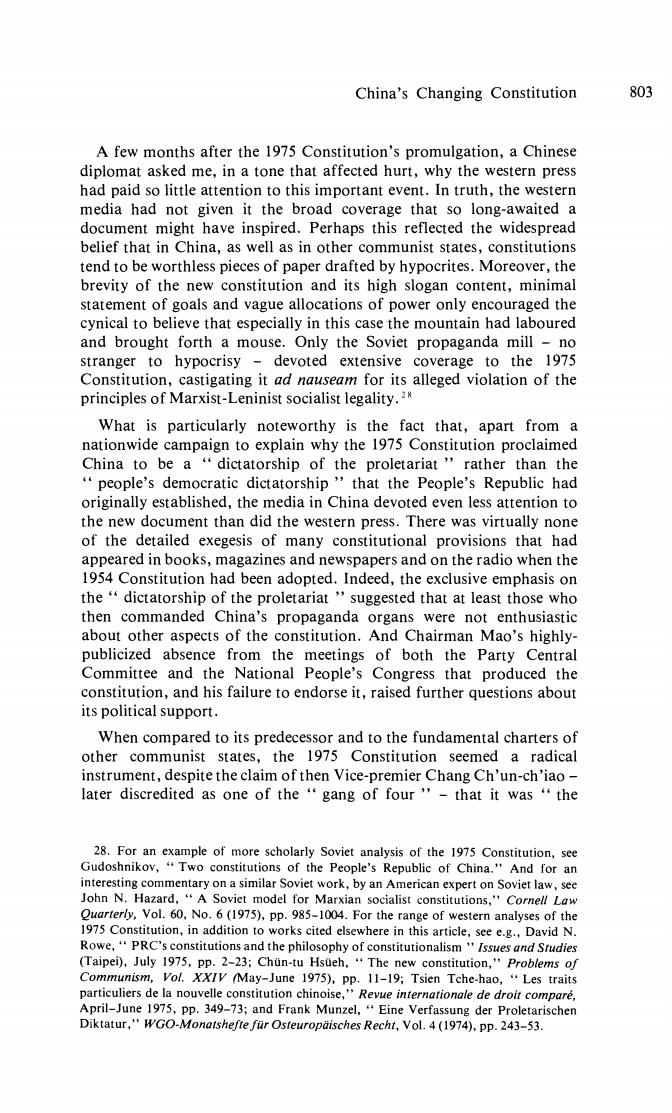正在加载图片...

China's Changing Constitution 803 A few months after the 1975 Constitution's promulgation,a Chinese diplomat asked me,in a tone that affected hurt,why the western press had paid so little attention to this important event.In truth,the western media had not given it the broad coverage that so long-awaited a document might have inspired.Perhaps this reflected the widespread belief that in China,as well as in other communist states,constitutions tend to be worthless pieces of paper drafted by hypocrites.Moreover,the brevity of the new constitution and its high slogan content,minimal statement of goals and vague allocations of power only encouraged the cynical to believe that especially in this case the mountain had laboured and brought forth a mouse.Only the Soviet propaganda mill-no stranger to hypocrisy devoted extensive coverage to the 1975 Constitution,castigating it ad nauseam for its alleged violation of the principles of Marxist-Leninist socialist legality.2 What is particularly noteworthy is the fact that,apart from a nationwide campaign to explain why the 1975 Constitution proclaimed China to be a "dictatorship of the proletariat"rather than the "people's democratic dictatorship"'that the People's Republic had originally established,the media in China devoted even less attention to the new document than did the western press.There was virtually none of the detailed exegesis of many constitutional provisions that had appeared in books,magazines and newspapers and on the radio when the 1954 Constitution had been adopted.Indeed,the exclusive emphasis on the "dictatorship of the proletariat suggested that at least those who then commanded China's propaganda organs were not enthusiastic about other aspects of the constitution.And Chairman Mao's highly- publicized absence from the meetings of both the Party Central Committee and the National People's Congress that produced the constitution,and his failure to endorse it,raised further questions about its political support. When compared to its predecessor and to the fundamental charters of other communist states,the 1975 Constitution seemed a radical instrument,despite the claim of then Vice-premier Chang Ch'un-ch'iao- later discredited as one of the 'gang of four"-that it was "the 28.For an example of more scholarly Soviet analysis of the 1975 Constitution,see Gudoshnikov,"Two constitutions of the People's Republic of China."And for an interesting commentary on a similar Soviet work,by an American expert on Soviet law,see John N.Hazard,"A Soviet model for Marxian socialist constitutions,"Cornell Law Quarterly,Vol.60,No.6(1975),pp.985-1004.For the range of western analyses of the 1975 Constitution,in addition to works cited elsewhere in this article,see e.g.,David N. Rowe,PRC's constitutions and the philosophy of constitutionalism"Issues and Studies (Taipei),July 1975,pp.2-23;Chun-tu Hsueh,"The new constitution,"Problems of Communism,Vol.XXIV (May-June 1975),pp.11-19:Tsien Tche-hao,"Les traits particuliers de la nouvelle constitution chinoise,"Revue internationale de droit compare, April-June 1975,pp.349-73;and Frank Munzel,"Eine Verfassung der Proletarischen Diktatur,"WGO-Monatshefte fur Osteuropaisches Recht,Vol.4(1974),pp.243-53.China's Changing Constitution 803 A few months after the 1975 Constitution's promulgation, a Chinese diplomat asked me, in a tone that affected hurt, why the western press had paid so little attention to this important event. In truth, the western media had not given it the broad coverage that so long-awaited a document might have inspired. Perhaps this reflected the widespread belief that in China, as well as in other communist states, constitutions tend to be worthless pieces of paper drafted by hypocrites. Moreover, the brevity of the new constitution and its high slogan content, minimal statement of goals and vague allocations of power only encouraged the cynical to believe that especially in this case the mountain had laboured and brought forth a mouse. Only the Soviet propaganda mill - no stranger to hypocrisy - devoted extensive coverage to the 1975 Constitution, castigating it ad nauseam for its alleged violation of the principles of Marxist-Leninist socialist legality. 2 8 What is particularly noteworthy is the fact that, apart from a nationwide campaign to explain why the 1975 Constitution proclaimed China to be a " dictatorship of the proletariat " rather than the " people's democratic dictatorship " that the People's Republic had originally established, the media in China devoted even less attention to the new document than did the western press. There was virtually none of the detailed exegesis of many constitutional provisions that had appeared in books, magazines and newspapers and on the radio when the 1954 Constitution had been adopted. Indeed, the exclusive emphasis on the " dictatorship of the proletariat " suggested that at least those who then commanded China's propaganda organs were not enthusiastic about other aspects of the constitution. And Chairman Mao's highlypublicized absence from the meetings of both the Party Central Committee and the National People' s Congress that produced the constitution, and his failure to endorse it, raised further questions about its political support. When compared to its predecessor and to the fundamental charters of other communist states, the 1975 Constitution seemed a radical instrument, despite the claim of then Vice-premier Chang Ch'un-ch'iao - later discredited as one of the " gang of four " - that it was " the 28. For an example of more scholarly Soviet analysis of the 1975 Constitution, see Gudoshnikov, " Two constitutions of the People's Republic of China." And for an interesting commentary on a similar Soviet work, by an American expert on Soviet law, see John N. Hazard, " A Soviet model for Marxian socialist constitutions," Cornell Law Quarterly, Vol. 60, No. 6 (1975), pp. 985-1004. For the range of western analyses of the 1975 Constitution, in addition to works cited elsewhere in this article, see e.g., David N. Rowe, " PRC's constitutions and the philosophy of constitutionalism " Issues and Studies (Taipei), July 1975, pp. 2-23; Chun-tu Hsueh, " The new constitution," Problems of Communism, Vol. XXIV (May-June 1975), pp. 11-19; Tsien Tche-hao, " Les traits particuliers de la nouvelle constitution chinoise," Revue internationale de droit compare, April-June 1975, pp. 349-73; and Frank Munzel, " Eine Verfassung der Proletarischen Diktatur," WGO-Monatsheftefur OsteuropaischesRecht, Vol. 4 (1974), pp. 243-53